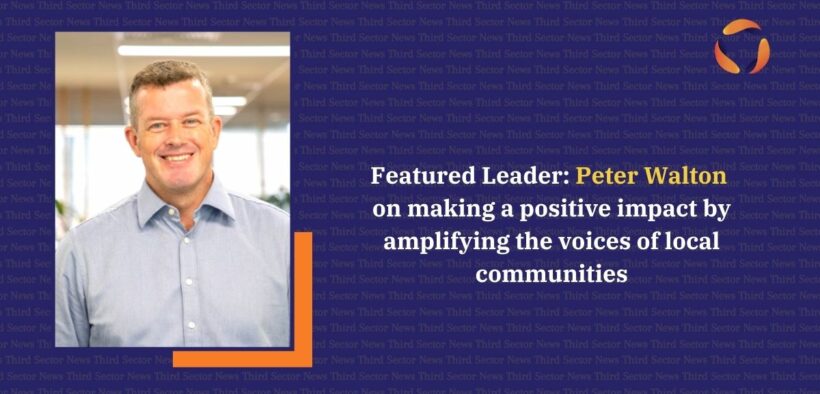For more than 75 years, CARE Australia has provided humanitarian relief all around the world. Over the decades, the organisation has evolved to now focus on combatting global poverty.
Third Sector News spoke with Peter Walton, Chief Executive Officer of CARE Australia, about his leadership strategies and the organization’s drive to eradicate poverty and social injustice.
Being in the not-for-profit sector for more than two decades, what experiences can you attribute to your success as a leader?
I like to think I have tried to lead in a way that doesn’t lose sight of the overarching aim, and not just what we need to do, but how we need to do it. In my career, there is an obligation to spend public money well. Staying focused on ensuring relevance and impact is key, even if that means taking yourself out of your comfort zone to ask the difficult challenges that this sector tries to address. Above that, I have never professed to be a subject matter specialist in all areas I have overseen, but I like to think I have the humility to recognise that any success I have had has mostly been supplemented by identifying and nurturing effective teams who have the necessary skills which complement my own. I think it is healthy to have ‘imposter syndrome’ from time to time, otherwise, there is a greater risk of overconfidence or hubris.
What are some of the challenges you’ve encountered after being appointed CEO of CARE Australia?
I think we have all lived – and are living – through quite extraordinary times. Joining CARE just before the pandemic has meant all the challenges and uncertainty we have all faced. The transition to ‘work from home’, the need to support international work without being able to travel, the fears of the economic impacts of Covid and what that would mean for our supporters. Aside from these shared adjustments, Covid was an opportunity to go hard and fast on a number of changes that were overdue. I am very proud that CARE is a lead proponent of transforming international aid, embedding market-based approaches into our operating model, and also recognising that sometimes doing fewer things well can have a bigger impact than trying to respond to too many things all at once.
Which leadership strategies do you believe have had the most significant influence on you and your team?
I could answer this question with a whole list of management and leadership buzzwords, but my personal strategy is quite straightforward. I play with a straight bat. I try to actively listen to all views and then I aim to explain my decisions and the logic of how I got there. I think this goes to the heart of being authentic, even if leadership means making tough and sometimes unpopular decisions. I have sought to help create a common vision that everyone can get behind, recognise effort, empower and support the real experts for any position, and also maintain a healthy tension between projecting ambition whilst dealing with the day-to-day. You can’t really fake sincerity, so I hope people recognise that everything I do is with the right intention.
What sets CARE Australia apart from other organisations working towards defeating poverty and achieving social justice?
I strongly believe that despite some amazing work by international NGOs over many years, the sector is no longer fit for purpose – and perhaps never was. There are both moral/ ethical and pure business reasons why the sector needs to change. The sector and the broader aid ‘industry’ are being accused of being ‘colonial’, ‘racist’ and perpetuating the concept of ‘white saviorism‘. Communities around the world challenged with issues of exclusion, deprivation or other chronic or acute vulnerabilities, don’t necessarily need ‘saving’ but a level playing field. At the same time, the world is facing unprecedented challenges. Even before the pandemic, the war in Ukraine, and the unfolding global hunger crisis, there was a shortfall in humanitarian financing. The projections around a generational reversal in gender equality gains, the rise in gender-based violence and the existential threats associated with a warming planet, mean we have to operate differently.
I am incredibly proud that CARE is playing a leading role in rising to these challenges and continues to change to ensure it can rise to the challenge and remain relevant and impactful. We do not seek to be a jack of all trades, ‘master of none’ – we have focused on areas where we know we can really make a positive impact for women, girls and their communities. We have embraced strengths-based, solutions-orientated marketing and fundraising. We are amplifying the voice of local communities (the images and language that perpetuate harmful stereotypes won’t be found in our playbook). We have also been a founding member of the global movement to transform aid, the www.PledgeforChange2030.org is seeking to really inspire genuine and accountable change based on the principles of solidarity, humility, self-determination and equality.
Related: CARE Australia endorses historic pledge focusing on equitable partnerships, authentic storytelling, and influencing wider change
Menchie Khairuddin is a writer Deputy Content Manager at Akolade and content producer for Third Sector News. She is passionate about social affairs specifically in mixed, multicultural heritage and not-for-profit organisations.


































































































































































